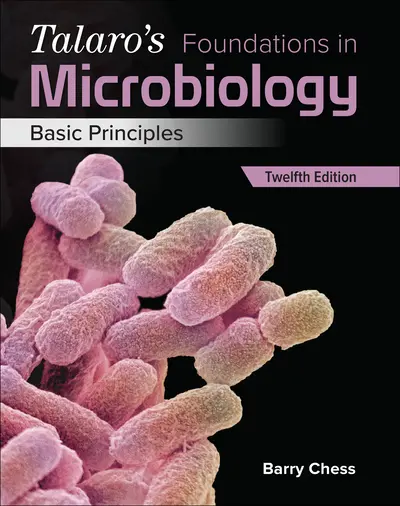My Account Details

ISBN10: 1265112665 | ISBN13: 9781265112660

* The estimated amount of time this product will be on the market is based on a number of factors, including faculty input to instructional design and the prior revision cycle and updates to academic research-which typically results in a revision cycle ranging from every two to four years for this product. Pricing subject to change at any time.
Instructor Information
Quick Actions (Only for Validated Instructor Accounts):
Talaro’s Foundations in Microbiology: Basic Principles is an allied health microbiology text with a taxonomic approach to the disease chapters. It offers an engaging and accessible writing style through the use of case studies and analogies to thoroughly explain difficult microbiology concepts.
CHAPTER 2- The Chemistry of Biology
CHAPTER 3- Tools of the Laboratory: Methods of Studying Microorganisms
CHAPTER 4- A Survey of Prokaryotic Cells and Microorganisms
CHAPTER 5- A Survey of Eukaryotic Cells and Microorganisms
CHAPTER 6- An Introduction to Viruses, Viroids, and Prions
CHAPTER 7- Microbial Nutrition, Ecology, and Growth
CHAPTER 8- An Introduction to Microbial Metabolism: The Chemical Crossroads of Life
CHAPTER 9- An Introduction to Microbial Genetics
CHAPTER 10- Genetic Engineering and Genetic Analysis
CHAPTER 11- Physical and Chemical Agents for Microbial Control
CHAPTER 12- Drugs, Microbes, Host—The Elements of Chemotherapy
CHAPTER 13- Microbe–Human Interactions: Infection, Disease, and Epidemiology
CHAPTER 14- An Introduction to Host Defenses and Innate Immunities
CHAPTER 15- Adaptive, Specific Immunity, and Immunization
CHAPTER 16- Disorders in Immunity
CHAPTER 17- Procedures for Identifying Pathogens and Diagnosing Infections
Accessibility
Creating accessible products is a priority for McGraw Hill. We make accessibility and adhering to WCAG AA guidelines a part of our day-to-day development efforts and product roadmaps.
For more information, visit our accessibility page, or contact us at accessibility@mheducation.com
Need support? We're here to help - Get real-world support and resources every step of the way.